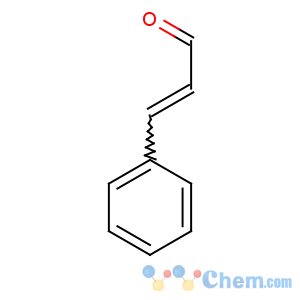Cinnamaldehyde
-
- Product NameCinnamaldehyde
- CAS No.104-55-2
- Purity≥99%
- Min Quantity
- Price~

 View Contact Detail
View Contact Detail
-
 Molecular Structure
Molecular Structure
Detailed Description
English name : CinnamaldehydeOther names: 3-phenyl-2-propena; 3-Phenyl-2-propenaldehyde; 3-phenyl-acrolei; 3-Phenylacrolein; 3-Phenylacrylaldehyde; Abion CA; abionca;Acrolein, 3-phenyl-
CAS No.: 104-55-2
Molecular formula: C9H8O
Molecular weight: 132.16
Molar mass: 132.16g/mol
Melting point: ?9-?4?°C(lit.)
Boiling point: 250-252?°C(lit.)
Flash point: 160?°F
Refractive index:n20/D 1.622(lit.)
Properties : yellow liquid with an odour of cinnamon; Combustible, yellowish, oily liquid (thickens on exposure to air). Strong pungent, spicy, cinnamon odor.
Purity : 99%
Packaging : 500g;1kg;5kg,10kg,25kg,50kg
Storage method: Warehouse low temperature, ventilation, dry; Fire prevention;Keep separate from oxidants and food ingredients.
Usage :
One. Application of cinnamaldehyde in medicine
1. Sterilization, disinfection and antisepsis, especially for fungi.
2. Anti-ulcer, strengthen stomach and intestinal movement.
3. Lipolysis.
4. Antiviral effect.
5. Anti-cancer effect. .
6. Dilate blood vessels and lower blood pressure.
Two. Application of cinnamaldehyde in chemical industry
1. Organic chemical synthesis.
2. In industry, it can also be made into developer and experimental reagent.
3. Insecticide, mosquito repellent, refrigerator deodorant, preservative, etc.
4. Cinnamaldehyde can also be used as a bactericidal algicide and acid corrosion inhibitor in oil extraction.
5. Cinnamaldehyde can also be widely used in antiseptic and mildew preservation.
6. Cinnamaldehyde can be used to make chewing gum.